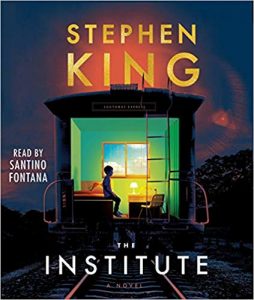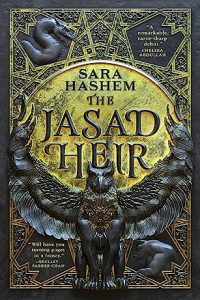Stefan Dziemianowicz and Amy Goldschlager Review The Institute by Stephen King
 The Institute, Stephen King (Scribner 978-1-9821-1056-7, $30.00, 576pp, hc) September 2019.
The Institute, Stephen King (Scribner 978-1-9821-1056-7, $30.00, 576pp, hc) September 2019.
It wouldn’t be accurate to say that Stephen King’s new novel, The Institute, is a blueprint for his career as a novelist, but in it King reprises themes that he has explored regularly over the past 45 years, notably: children endowed with wild paranormal talents (think Carrie, The Shining, and even End of Watch, the third novel in his Bill Hodges crime trilogy) that unscrupulous adults attempt to exploit (Firestarter, anyone?), and those children discovering, while on the run from pursuers (Doctor Sleep? Check.) that they are a formidable force for saving themselves when they band together and pool their powers (surely you’ve read – or at least seen the movie adaptation of – It). This is not a case of King retreading ground that he’s covered before. Rather, it’s an example of how he finds new angles from which to present familiar ideas rich with possibilities.
At its broadest, The Institute is the story of Luke Ellis, a 12-year-old prodigy living in Minneapolis whose academic achievements at a school for gifted children are so far off the charts that he’s contemplating dual enrollment at MIT and Emerson College – until one grim evening when a tactical squad of kidnappers invades his home, murders his parents, and abducts him to the titular top-secret Institute, located in the backwoods of rural Maine. There, Luke discovers that he’s been imprisoned with a clutch of kids approximately the same age as him, all of whom possess nascent powers of telekinesis and telepathy (abbreviated throughout as TK and TP) in varying degrees.
The purpose of the Institute is not immediately apparent to Luke, owing to the unforthcoming staff of doctors and guards who subject him and his fellow inmates to inspections, medical tests, injections, and ritualized abuse so heartless (in one particularly hideous instance involving an immersion tank) that any faithful film adaptation of this novel will likely get slapped with an R-rating. In time, though, he intuits that his treatment in what is known as the Institute’s Front Half is intended to develop and amplify his paranormal powers. Eventually, kids who survive treatment in the Front Half are sent to the Back Half, where they are slowly but systematically shorn of the final vestiges of their humanity and reduced to a core of pure paranormal potential – the equivalent of stripping the insulation off of a live wire.
What’s the objective of this inhumane conditioning? Luke gets an inkling when he breaches the facility’s aggressively insular security and stumbles upon a news story concerning a presidential hopeful from the House of Representatives who was gravely injured when the car he was riding in unexpectedly veered out of control. For Luke, this clicks with an interrogation he went through with one of the orderlies who referred to him as a “conscript” for a war that’s being waged: “This is not an arms race but a mind race, and if we lose, the consequences would be more than dire; they would be unimaginable. You may be only twelve, but you are a soldier in an undeclared war.” Luke doesn’t know what the sides are in this war, who its generals are, or the nature of its terms of engagement – these remain murky for the novel’s duration – but he connects enough dots to see the big picture: the Institute exists to weaponize its extraordinary inmates as expendable paranormal IEDs – or “psychic drones,” as Luke thinks of them.
Lest it seem that I’ve given away all of the surprises in King’s novel without the decency of a spoiler alert, rest assured I haven’t. The second half of The Institute is a suspenseful chase scenario that follows Luke’s escape from the facility to Du Pray SC, and the company of Tim Jamieson, an ex-cop with an admirable code of honor who has drifted there in the novel’s carefully set up opening chapters. Desperate to protect the Institute’s anonymity and, if possible, retrieve the asset in whom they have invested so much research, the Institute dispatches a S.W.A.T. team to Du Pray, having paid off people down the line to turn a blind eye when the gunfire starts.
The idea of using psychic sensitives endowed with supernatural powers as weapons of mass (or at least controlled) destruction is not a new one in fantastic fiction; it dates back at least to Richard Matheson’s 1951 story “Witch War” and probably most famously to John Farris’s 1976 novel The Fury (to which King’s Firestarter gave something of a nod). King certainly works this theme for some of the more spectacular horrors in his book – as you read about the terrible abuses the kids endure, you wait for that inevitable moment when they learn to harness their psychic energies and fight back – but he’s got his eye on even more harrowing matters. The novel’s worst horror is the complete dehumanization that the Institute imposes on the children. Luke reflects mordantly on how totally depersonalized he has become when he realizes that an ID chip injected into his earlobe allows his every move to be monitored remotely by the facility’s computer techs: “Lucas David Ellis, who had been planning to matriculate at MIT and Emerson, had been reduced to a blinking dot on a computer screen.” The staff has cultivated an attitude of callous indifference to the humanity of the inmates – and the inhumanity of their behavior towards them. The zealous doctor in charge of the facility refers to Jake as “property” when she demands that Tim return him. While testing his telepathy skills, a programmer slaps Luke in the face when he refuses to cooperate, demonstrating her complete insensitivity to his suffering: “He looked at Priscilla and saw no hesitation. No regret. Zero empathy. Nothing. Luke realized he wasn’t a child at all to her. She had made some crucial separation in her mind. He was a test subject. You made it do what you wanted, and if it didn’t you administered what the psychologists called negative reinforcement.” What’s more, the Institute’s personnel are enabled and emboldened by an equally indifferent network of stringers around the world, who alert them to the whereabouts of potentially gifted children, who warn them about people who ask the wrong questions, and who “simply banked the extra income of five hundred dollars a month, made their reports when reports had to be made, and asked no questions.”
In interviews King has revealed that he had begun plotting his book years ago and now finds some of its horrors eerily prescient. Whatever design he had in mind when he set out to write The Institute, his Constant Readers will be coming to the book with an awareness of a world in which the imprisonment of children who have been separated from their parents is front-page news, in which the marginalized are objectified, demonized, and treated inhumanely, and in which unfounded rumors of shadowy conspiracies are promoted regularly in contemporary political discourse. Intentionally or not, King has written a very chilling parable for our times.
-Stefan Dziemianowicz
This review and more like it in the November 2019 issue of Locus.
 The Institute, Stephen King; Santino Fontana, narrator (Simon & Schuster Audio 978-1-50827906-8, $49.99, CD, 19 hr., unabridged [also available as a digital download]) September 2019.
The Institute, Stephen King; Santino Fontana, narrator (Simon & Schuster Audio 978-1-50827906-8, $49.99, CD, 19 hr., unabridged [also available as a digital download]) September 2019.
Blend King’s Firestarter and “Everything’s Eventual”, add a dash from the movie Logan and a very healthy sprinkle of Ursula K. Le Guin’s “The Ones Who Walk Away from Omelas”, and you’ll have this thriller, which if considerably less than fresh and not without its plot holes, is a great deal of fun. I love me my Stephen King novels about psychic kids.
The titular Institute grabs children with weak telepathic and telekinetic abilities from their beds and transports them to their isolated facility in Maine, disposing of their parents along the way. Bullying, humiliating medical tests, and a mysterious cocktail of drugs breaks down the young inmates’ spirits and prepares them for a deadly purpose. That is, until the Institute kidnaps Luke Ellis and foolishly focuses on his telekinesis instead of his genius-level intellect, which allows him to do something none of the other children have ever done… escape, sparking deadly confrontations at both the Institute and a small Southern town where a disgraced former cop has taken refuge.
The audiobook production heightens the awareness of how short the chapters are, adding a staccato beat to the action. Although narrator Santino Fontana thinks the word “douche” should be pronounced “doo-SHI,” his vocal range is wide and interesting. He also has an intriguing approach toward third-person omniscient narration: He shifts accent and pitch to sound like the character whose perspective drives that section.
While you’re awaiting the long, slow push to the novel’s denouement, questions will undoubtedly have time to arise. How can the organization running the Institute afford a private jet, up-to-date armaments, an army of stringers across the country who are tracking these psychic kids, and elite extraction teams to grab the kids and murder their guardians while remaining undetected, but somehow can’t afford to update and maintain the security systems? True, complacency can set in over the decades, physical intimidation serves to keep most of the kids in line, and the threat of constant surveillance is nearly as effective as actual, functioning surveillance. But given that these kids could be the key to saving the world from ultimate destruction, wouldn’t you want to be more careful?
As long as you’re not looking for a particularly fresh story and you don’t mind a plot full of holes, the book can be fun.
–Amy Goldschlager
Stefan Dziemianowicz, Contributing Editor, is author of The Annotated Guide to Unknown and Unknown Worlds and a collection of re-told urban legends, Bloody Mary and Other Tales for a Dark Night, and editor (with S.T. Joshi) of three-volume reference work Supernatural Literature of the World: An Encyclopedia and of more than thirty anthologies including Bram Stoker Award-winning Horrors: 365 Scary Stories, Famous Fantastic Mysteries, and 100 Ghastly Little Ghost Stories. Between 1991 and 1999, he edited critical magazine Necrofile: The Review of Horror Fiction. His critical work on horror and fantasy fiction has appeared in Washington Post Book World, Lovecraft Studies, and other publications, and he is a regular contributor to Publishers Weekly.
Amy Goldschlager, Contributing Editor, is an editor, proofreader, and book/audiobook reviewer who has worked for several major publishers. She is a former curator of the New York Review of Science Fiction Reading Series. In addition to her Locus column, she has contributed to the Los Angeles Review of Books, Kirkus, Publishers Weekly, AudioFile magazine, and ComicMix. She lives in Brooklyn and exists virtually at www.amygoldschlager.com.
 While you are here, please take a moment to support Locus with a one-time or recurring donation. We rely on reader donations to keep the magazine and site going, and would like to keep the site paywall free, but WE NEED YOUR FINANCIAL SUPPORT to continue quality coverage of the science fiction and fantasy field.
While you are here, please take a moment to support Locus with a one-time or recurring donation. We rely on reader donations to keep the magazine and site going, and would like to keep the site paywall free, but WE NEED YOUR FINANCIAL SUPPORT to continue quality coverage of the science fiction and fantasy field.






